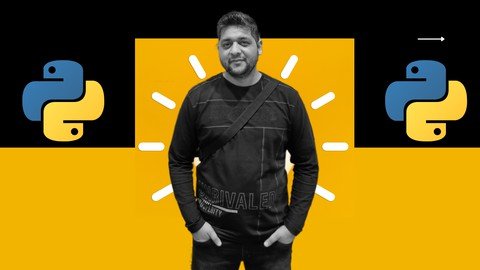
Published 5/2023
MP4 | Video: h264, 1280x720 | Audio: AAC, 44.1 KHz
Language: English | Size: 350.05 MB | Duration: 1h 14m
Learn the Most loved programming language by developers, data scientists, software engineers & even hackers
Free Download What you'll learn
Python Syntax, comments, datatypes, variables, numbers, casting, strings, booleans, operators, list, tuples, sets, dictionary
if...else, while loop, for loop, functions, lambda, array, classes, objects, inheritance, iterators, scope, modules, dates, maths, json
regex, pip, try...except, user input, string formating, rapid prototyping, or for production-ready software development,
handle big data and perform complex mathematics, software to create workflows
Requirements
No programming experience needed. You will learn everything you need to know.
Description
What is Python?Python is a popular programming language. It was created by Guido van Rossum, and released in 1991.It is used for:web development (server-side),software development,mathematics,system scripting.What can Python do?Python can be used on a server to create web applications.Python can be used alongside software to create workflows.Python can connect to database systems. It can also read and modify files.Python can be used to handle big data and perform complex mathematics.Python can be used for rapid prototyping, or for production-ready software development.Why Python?Python works on different platforms (Windows, Mac, Linux, Raspberry Pi, etc).Python has a simple syntax similar to the English language.Python has syntax that allows developers to write programs with fewer lines than some other programming languages.Python runs on an interpreter system, meaning that code can be executed as soon as it is written. This means that prototyping can be very quick.Python can be treated in a procedural way, an object-oriented way or a functional way.Good to knowThe most recent major version of Python is Python 3, which we shall be using in this tutorial. However, Python 2, although not being updated with anything other than security updates, is still quite popular.In this tutorial Python will be written in a text editor. It is possible to write Python in an Integrated Development Environment, such as Thonny, Pycharm, Netbeans or Eclipse which are particularly useful when managing larger collections of Python files.Python Syntax compared to other programming languagesPython was designed for readability, and has some similarities to the English language with influence from mathematics.Python uses new lines to complete a command, as opposed to other programming languages which often use semicolons or parentheses.Python relies on indentation, using whitespace, to define scope; such as the scope of loops, functions and classes. Other programming languages often use curly-brackets for this purpose.
Overview
Section 1: Complete Python Tutorial For Beginners to Expert
Lecture 1 Learn Basic of Python Syntax, Python Indentation
Lecture 2 Create Variable in Python
Lecture 3 Variable Names in Python
Lecture 4 Assign Multiple Values to Variable in Python
Lecture 5 Output Variables in Python
Lecture 6 Global Variables in Python
Lecture 7 Built in datatype in python
Lecture 8 Numeric Data Type in Python
Python is one of the most loved programming languages by developers, data scientists, software engineers, and even hackers because of its versatility, flexibility, and object-oriented features.,For anyone looking to switch careers into the tech world through coding
Homepage
https://www.udemy.com/course/complete-python-tutorial-for-beginners-to-expert/
Buy Premium From My Links To Get Resumable Support,Max Speed & Support Me
Links are Interchangeable - Single Extraction
Comments

